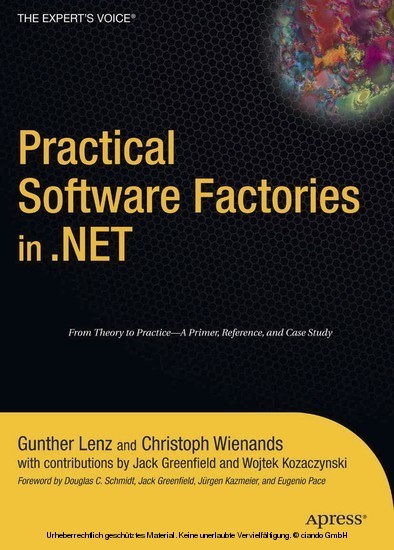Lenz, Gunther (Autor)
Wienands, Christoph (Autor)
Practical Software Factories in .NET

Beschreibung
Many advances have been made in the area reusability during software development, using, for example, component based and framework-driven development techniques. Nevertheless, the majority of software projects are treated more or less as "one-off" builds. Consider for example, Siemens, who provide a range of imaging software, from MRI to ultrasound. From one perspective each of these are highly specialized products and were designed and built separately, as standalone products. However, in terms of the basic image generation and manipulation techniques that they need to perform, they actually have a lot in common.
The Software Factory methodology is based on recognition of these similarities and a drive to extend the concept of "reusability" to the point where we achieve entirely automated product lines. Based on an analysis and understanding of the common features and techniques of a set of applications, a Software Factory defines a tailored, end-to-end methodology for building these applications. At the heart of the Software factory methodology is the concept of Domain Specific Languages (DSLs), which in essence are development environments specifically tailored to the set of applications in hand. It removes a certain degree of flexibility but greatly enhances productivity by removing a lot of the coding complexity (for an analogy, consider the use of the now ubiquitous drag-and-drop controls in Winforms or Visual Basic).
Further, in the SF methodology, patterns, process advice, and best practices can be harvested and applied for all applications in the set.
There are some good books on the theory of SF already on the market. Up until this point, a lot of these concepts were fairly theoretical and abstract. As one Amazon reviewer put it:" The bad: This book should not be seen as a technical how-to book. Do not expect to be able to apply much of what he describes within your software development routine..."However, with the emergence of the Microsoft Software Factories SDK, upon which this book is based, they are moving firmly into the mainstream. For the first time, with this book, .NET developers and architects can see how to put this methodology to practical use in real projects. Throughout the book, every chapter is accompanied with hands-on examples performed on a real-world case study, using Microsoft's Software Factory tools.
Software Factories are Microsoft's vision of the future of software development. Certain products, such as Visual Studio Team Systems, already provide some support for SF concepts, via use of parts of the DSL toolkit that is provided in the SDK. In Orcas (codename for the next version of Visual Studio) support will be much more comprehensive. In short, all professional .NET developers and architect will want to appraise themselves of the practical SF techniques that this book provides.
The Software Factory methodology is based on recognition of these similarities and a drive to extend the concept of "reusability" to the point where we achieve entirely automated product lines. Based on an analysis and understanding of the common features and techniques of a set of applications, a Software Factory defines a tailored, end-to-end methodology for building these applications. At the heart of the Software factory methodology is the concept of Domain Specific Languages (DSLs), which in essence are development environments specifically tailored to the set of applications in hand. It removes a certain degree of flexibility but greatly enhances productivity by removing a lot of the coding complexity (for an analogy, consider the use of the now ubiquitous drag-and-drop controls in Winforms or Visual Basic).
Further, in the SF methodology, patterns, process advice, and best practices can be harvested and applied for all applications in the set.
There are some good books on the theory of SF already on the market. Up until this point, a lot of these concepts were fairly theoretical and abstract. As one Amazon reviewer put it:" The bad: This book should not be seen as a technical how-to book. Do not expect to be able to apply much of what he describes within your software development routine..."However, with the emergence of the Microsoft Software Factories SDK, upon which this book is based, they are moving firmly into the mainstream. For the first time, with this book, .NET developers and architects can see how to put this methodology to practical use in real projects. Throughout the book, every chapter is accompanied with hands-on examples performed on a real-world case study, using Microsoft's Software Factory tools.
Software Factories are Microsoft's vision of the future of software development. Certain products, such as Visual Studio Team Systems, already provide some support for SF concepts, via use of parts of the DSL toolkit that is provided in the SDK. In Orcas (codename for the next version of Visual Studio) support will be much more comprehensive. In short, all professional .NET developers and architect will want to appraise themselves of the practical SF techniques that this book provides.
Produktdetails
| ISBN/GTIN | 978-1-4302-0181-6 |
|---|---|
| Seitenzahl | 214 S. |
| Kopierschutz | mit Wasserzeichen |
| Dateigröße | 5468 Kbytes |

